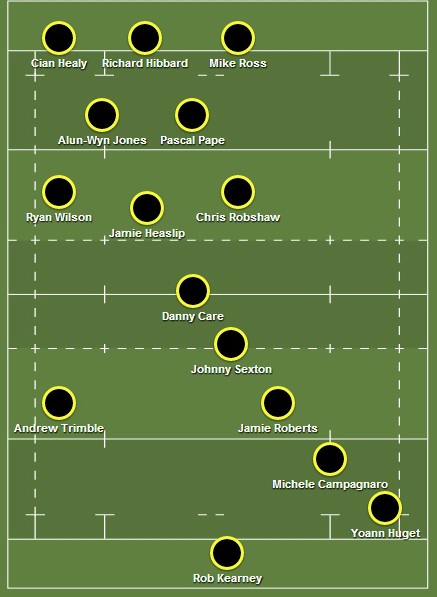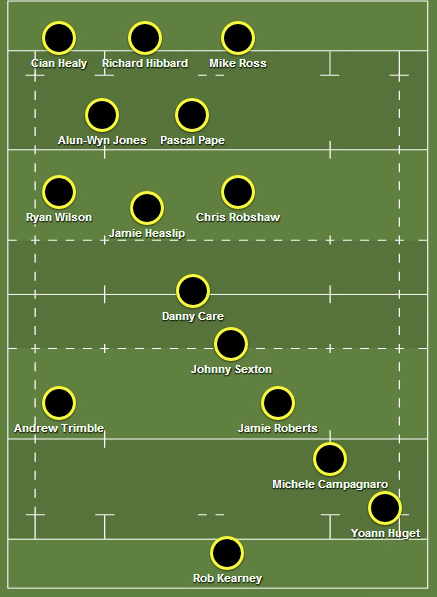The Six Nations returned with a bang as defending champions Wales, France and Ireland all enjoyed Round One victories.
It was a mouth-watering round of action which had it all.
France and England produced one of the most nail-biting Six Nations affairs, eventually edged by the hosts in a cauldron-like Stade de France.
Champions Wales launched their bid for an unprecedented third successive title with victory over Italy; but while the score line appeared heavily in their favour, they were not without scares.
In Sunday’s lone fixture, Ireland made light work of Scotland, with a scintillating second-half performance allowing then to race away in Dublin.
-
Full-back – Rob Kearney
While Wales’ Leigh Halfpenny did little out of line, scoring 13 of his side’s 23 points, Kearney’s authoritative display edged it for me. The Ireland No 15 produced a tackling masterclass to deny Scotland before giving the hosts breathing space when he seized upon some lax defending to score his side’s third try.
-
Right wing – Yoann Huget
Although both his tries enjoyed elements of luck, the France winger constantly had the better of England’s Jonny May and Alex Goode. Caught England napping on 30 seconds to score the opener from Jules Plisson’s dink through and took advantage when the fly-half’s ball wrong-footed the visitors for the second. Fast and aggressive throughout.
-
Outside centre – Michele Campagnaro
You would never guess the 20-year-old was making his tournament debut. A brace against the defending champions. The second, a sensational individual effort, saw the Italian centre intercept Leigh Halfpenny’s pass before racing half the length of the field to touch down.
-
Inside centre – Jamie Roberts
As Italy tried to force their foot in the door, Roberts led the Welsh resurgence as they diverted attention to the opposite end of the field. After Michele Campagnaro’s second try, Lions back Roberts blasted his way through the Italian defence as Wales mustered an emphatic response. His inside pass was collected by midfield partner Williams for a high-class try that Halfpenny converted to post a 14-point interval lead.
-
Left wing – Andrew Trimble
A winger that never loses energy or lacks gusto. The Ulster flyer registered his try at a crucial time for Ireland. Scoring just before the break established a firm platform on which to build for the Irish, allowing them to return to the field and run riot over a disarrayed Scottish defence.
-
Fly-half – Johnny Sexton
It’s been a steady start on the domestic frontier with Racing Metro, yet the fly-half came to live in the emerald green of Ireland. Took his time to get settled initially but when in full swing, Sexton pulled the strings expertly, orchestrating the run of play from the middle.
-
Scrum-half – Danny Care
Inspired the astonishing England second-half comeback in an intimidating Parisian atmosphere. Lethal on the break and came close to adding a try to his tally. As it was, the Harlequins No 9 had to settle for a fine drop goal as England took the lead for the first time in the match.
-
Loose-head prop – Cian Healy
Dominated his opposite number Moray Low from the off and proved to be an influential factor in Ireland’s run-away victory. The Leinsterman led the charge in the scrum, and in open play, enjoying a surging run in the loose midway through the second period.
-
Hooker – Richard Hibbard
Never one shy away from putting his body on the line, Hibbard ensured the Italian threat was duly thwarted with a brave and bold tackling masterclass. When Wales found themselves on the front for, the Ospreys hooker was first to put his hand up and make determined carries.
-
Tight-head prop – Mike Ross
Enjoyed a domineering afternoon alongside Cian Healy and Rory Best as the Irish scrum exposed gaping holes in the Scotland set-piece. Ryan Grant, Ross Ford and Moray Low appeared all at sea as Ireland thoroughly demolished the Scotland pack both in scrummaging and at the line-out.
-
Second row – Alun-Wyn Jones
Seven line-out wins. 10 tackles. 15 carries, taking mor territory than any other forward on the opening weekend. A constant beacon of light an indifferent Welsh performance. With Sam Warburton bench for the opener, Jones made the burden of captaincy look featherweight as he marshalled his troops through a potential storm.
-
Second row – Pascal Pape
Dubbed a “schoolyard bully” by former England forward Simon Shaw ahead of kick-off, the France captain did not fail to live up to his reputation. Pape was on-hand throughout as England’s phase-play looked set to break down the France defence. If anyone was to stop England’s first try, courtesy of Mike Brown, it would have been the spirited Pape after the ‘Quins full-back stepped inside Yoann Huget.
-
Blindside flanker – Ryan Wilson
The lone shining light in a faltering Scottish pack. With Ireland on-song in Dublin, the Glasgow Warriors loose forward made 13 successful tackles to delay the forthcoming onslaught. In the brief moments of Scottish attack, Wilson drove himself and his side over the gain line twice, but the visitors were unable to muster enough power to cause a Round One upset.
-
Openside flanker – Chris Robshaw
With England on the back foot, Robshaw stepped to the fore and led the charge, alongside Courtney Lawes, with an element if distinction. Nine carries over the gain line as England strode back into the game and never afraid to take on contact in a bid to gain further territory for his side.
-
Number eight – Jamie Heaslip
A stellar man-of-the-match performance after being named Ireland captain in the 11th hour following Paul O’Connell’s chest infection. Received a pass from Johnny Sexton to touch down Ireland’s first of the second half after a sublime break from the ruck by the No 10. Continued to lead with distinction throughout as Ireland piled the pressure on Scotland, who were quick to squander possession.
Why not have your say below? Who would make your XV?




